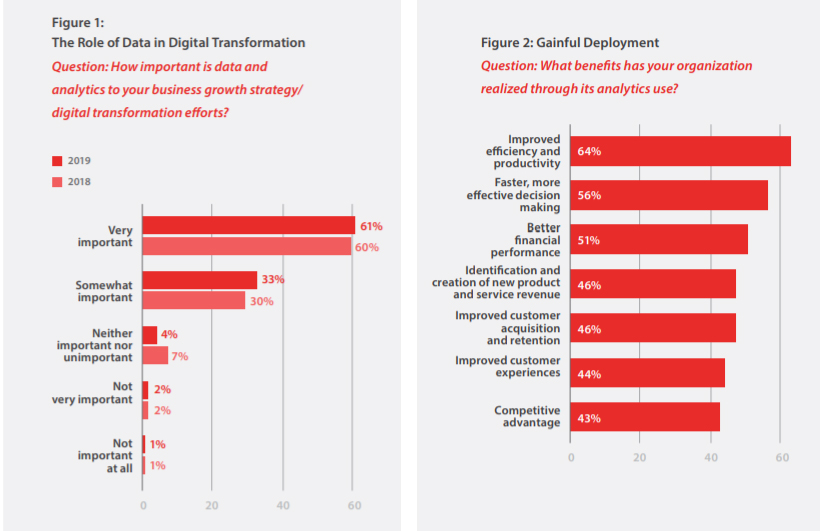What is Business Analytics?
Posted by: Yamini.S | Business Analytics
The objective of this blog:
To describe in simple terms about
- The importance of learning Business Analytics / Why to learn Business Analytics?
- What is Business Analytics?
- Applications of Business Analytics
Business Analytics is the most important skill in the 21st century. There will be enormous growth in the future, and this skill is already in demand. As technology penetrates every sector and every department within organizations, a lot of data is generated. So, the need for professionals who can collect, interpret, and analyze that information is skyrocketing.
Industries across the world are using data to:
- Drive process and cost efficiency (53%)
- Drive strategy and change (53%)
- Analyse workplace and workforce productivity (49%)
- Manage risk (48%)
- Develop new products and services (45%)
- Attain and retain customers (45%)
- Analyze how current products and services are used (44%)
- Monitor and improve financial performance (44%)
- Monitor the market (43%)
- Stay ahead of the competition (43%)
By considering this trend, acquiring in-depth knowledge of Business Analytics is essential to advancing a career and making better decisions in the work environment.
The ability to bring data-driven insights into decision-making is compelling. Even more, companies can't hire enough people with these capabilities. This is the way the world is going.
What is Business Analytics?
It is the capability that offers tremendous potential to improve any business.
Business Analytics helps to do three things;
- Descriptive Analytics: Using existing data to uncover deep insights about the business. This is called Business Intelligence.
- Predictive Analytics: Predicting the future based on existing data.
- Prescriptive Analytics: To optimize future results, present the user with a specific opinion and determine which business options are best with certain criteria.
Based on the business problem at hand, a suitable method can be used.

According to a recent study by Micro Strategy, 94% of Industries expressed that Data and Analytics are essential to their business growth and digital transformation efforts, as depicted in Figure 1.
Most Industries revealed that their efficiency and productivity had improved significantly. By implementing analytics in their organizations, they can make faster and more effective decisions, as shown in Figure 2.
Power and impact of Data:
To do that, we need data, and in this Digital Era, Data is all around us.
Data is collected whenever you make a purchase, visit a website, travel, make a phone call, or post on a social media site. Never before has so much data about many different things been collected and stored every second of every day.
Whatever Data we generate each day is equal to the sum of the data generated by our parents and grandparents throughout their lifetimes.
The power and impact of the data make us feel comfortable with the way we forecast the business.
In this world of big data, basic knowledge about data, i.e., the ability to analyze, interpret, and even question data, is more valuable. The immense potential of data for transforming businesses is the key here.
Why is Business Analytics popular now?
Since every company is going Digital, they need data professionals to organize and analyze massive amounts of data. Data accumulated from the 1960s through ERP. From 2000, three major shifts happen
- High Computing Power
- Complex algorithms
- The enormous growth of Data due to the internet availability
Because of these, Business Analytics has evolved;
Applications of Business Analytics:
Industries use this Business Analytics
- To make predictions and develop future strategies for growth
- To give Personalised Recommendations: Product / Service (E.g., YouTube/Amazon/Netflix Recommendations)
- Analysing Customer Behaviours: Predicting Customer Churns; Credit Card Defaulters based on their purchasing behaviours;
- Natural Language Processing: Siri, Google Assistants, Alexa;
- Google Maps, Google search, Facebook advertising, ad targeting;
- Sports Analytics:
- Web and Social Media Analytics: Sentiment Analysis / Text Mining / Topic Modelling
- Forecasting orders and Recipes
Tools used in Business Analytics:
The essential tools used in Business Analytics are R, Python for Data Science, Excel, Tableau, Power BI, Pentaho, Machine Learning algorithms, Statistics and Mathematics.
Conclusion:
Research says that the success rate or improvements in decision-making are three times higher if they are based on data rather than mere gut instinct or intuition.
People with the above-listed capabilities and understanding of business contexts will add more value and significantly impact them. The ultimate goal is to emphasize the importance of learning Business Analytics and describe the spectrum of Business Analytics and its applications. This idea leads to making decisions based on knowledge, not mere intuition, in an organisation.
